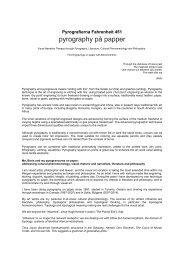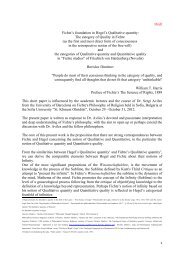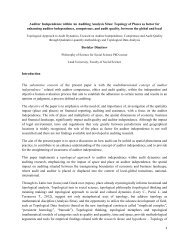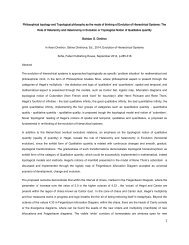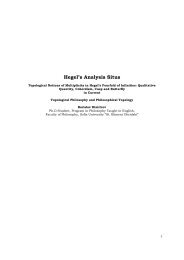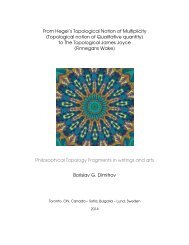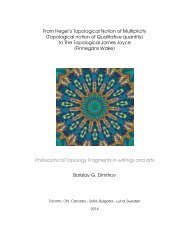Topological Ontology and Logic of Qualitative quantity
Qualitative quantity and BFO (Basic Formal Ontology) of /Barry Smith/ and YAMATO (Yet Another More Advanced Top-level Ontology) of /Riichiro Mizoguchi/
Qualitative quantity and BFO (Basic Formal Ontology) of /Barry Smith/ and YAMATO (Yet Another More Advanced Top-level Ontology) of /Riichiro Mizoguchi/
- No tags were found...
Create successful ePaper yourself
Turn your PDF publications into a flip-book with our unique Google optimized e-Paper software.
For Paterson, the “true mathematical logic is the self-determining <strong>of</strong> the concept <strong>of</strong><br />
mathematics, in which one starts at the simplest, most abstract stage <strong>of</strong> intuitive<br />
mathematics <strong>and</strong> teases out what it implicitly contains in a logical development (<br />
Entwicklung). In Hegelian logic, the starting point is, <strong>of</strong> course, abstract, indeterminate<br />
Being. A major difference from the formal approach to logic is that such a development is<br />
conceptual in character, the bringing out explicitly <strong>of</strong> the riches implicit in mathematical<br />
concepts <strong>and</strong> their interconnection.”<br />
Thinking <strong>of</strong> the centre <strong>of</strong> the debate between Gadamer’s hermeneutics <strong>and</strong> Alain Badiou’a<br />
attack on the core <strong>of</strong> dialectical hermeneutics – the human finitude”, we may follow Alan<br />
Paterson’s claim about “the conceptual finitude <strong>of</strong> the formal system.” This conceptual<br />
finitude, as determined in mathematical form, for Paterson is a mathematical question<br />
whose resolution required the genius <strong>of</strong> Gödel <strong>and</strong>, <strong>of</strong> course, a great deal <strong>of</strong> formal pro<strong>of</strong><br />
<strong>and</strong> calculation.”<br />
This conceptual finitude is not only mathematical question or hermeneutical question, but<br />
dialectical question in Hegelian sense. The answer to this question <strong>of</strong> the conceptual finitude<br />
will be probably given by the same dialectics, for which Gadamer expected to retrieve itself in<br />
hermeneutics <strong>and</strong> also by the hermeneutics that may retrieve itself in the language <strong>and</strong> logic<br />
<strong>of</strong> mathematic <strong>and</strong> topology in particular.<br />
For Paterson “such a development requires much detailed argument, <strong>and</strong> the classical<br />
Hegelian logic on which it is based will need to be substantially adapted <strong>and</strong><br />
supplemented.”<br />
In the conclusion <strong>of</strong> his paper, Paterson provides brief indication how Hegel's logic contains<br />
the key to three <strong>of</strong> the difficult problems <strong>of</strong> the philosophy <strong>of</strong> mathematics:<br />
“these are how to deal with<br />
1) the semantic paradoxes (such as the classical liar paradox),<br />
2) the logical paradoxes (such as the Russell-Zermelo paradox) <strong>and</strong><br />
3) the applicability <strong>of</strong> mathematics.<br />
These all center round the infinite in one form or another, whether in the form 1) <strong>of</strong> selfreflexive<br />
statements,47 or 2) <strong>of</strong> ``large'' infinite sets or 3) <strong>of</strong> the axiom <strong>of</strong> infinity (as in<br />
Russell's br<strong>and</strong> <strong>of</strong> logicism).”<br />
For Paterson, “these have their resolution in the three major transitions <strong>of</strong> the infinite in<br />
Hegel's treatment <strong>of</strong> Being (Sein). The first is the infinite qualitative progress (der qualitative<br />
unendliche Progreß) in the Section on Quality, the second is the infinite quantitative<br />
progress (der quantitative unendliche Progreß) in the Section on Quantity <strong>and</strong> the third is<br />
the infinite <strong>of</strong> the specification <strong>of</strong> measure (die Unendlichkeit der Spezifikation des Maßes)<br />
in the Section on Measure.<br />
In conclusion, Paterson claim is that “the reflexivity, effectively asserted in the failure <strong>of</strong> the<br />
formal approach to mathematics, poses the need for a framework which only the logic <strong>of</strong><br />
Hegel has the resources to cope with.<br />
Hegel's method <strong>of</strong> inquiry in terms <strong>of</strong> a conceptual development is the correct method for<br />
investigating the human activity that is called mathematics simply because it is intrinsic <strong>and</strong><br />
lets the subject develop itself (as a genuine infinite, a circle closed on itself) rather than<br />
assuming an external ``objective'' pose in which it is put in front <strong>of</strong> the investigator <strong>and</strong><br />
51





